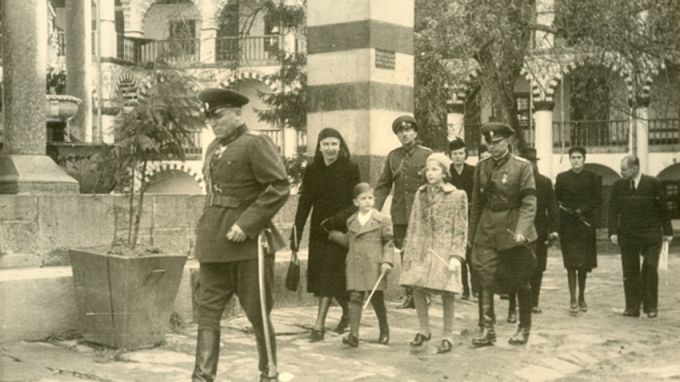
On 15 September, 1946, Queen Giovanna, wife of the late monarch Boris III received a double blow. A referendum abolished the monarchy and Bulgaria was declared a Republic; the government gave Giovanna herself an ultimatum to leave the country the next day, together with her infant children – 9-year old Simeon II and his 13-year old sister, Princess Maria Luisa. At the referendum in question, 95 percent of Bulgarians voted against the monarchy – in the 43 years that followed, the years of communist rule, the people would get accustomed to elections at which close to 100 percent voted for the communist party.
In September 1946, Bulgaria which was on the losing side in WW 2 was still under occupation by the Soviet troops and voting at the referendum was a far cry from what we now consider a free vote. Behind the screen of the coalition government of the Fatherland Front, the new communist administration acted ruthlessly. The so-called People’s Court was effective from December 1944 until April 1945. It was an ad hoc tribunal, set up in contravention of the Turnovo constitution and used as an instrument of the communist terror. The Court staged trials for people from the elite who couldn’t just “vanish” from the face of the Earth as was the case with so many other prominent figures across the country. Thus, the Regency, more than half of the MPs from the 25th National Assembly, high ranking officials from the state administration, prominent figures from the economic and intellectual elite, were all annihilated at a blow.
Why shouldn’t then the results of a referendum that was absolutely unlawful be declared valid? According to the Turnovo constitution, no such referendum was admissible, as it did not envisage a change of the state system. The only way it could be changed was by convening a Grand National Assembly, and this could only take place by a decision of the monarch, who was only 9 at the time.
But nothing could stop the propaganda machine, which just before the referendum, had been set in motion to brainwash the population. There was no television back then, radio was not very popular, so the principal propaganda tool were newspapers. And they gave just one point of view – that of the Fatherland Front government, and upheld just one position – the abolition of the monarchy. The church too gave way. Evidence of this is a letter written by the Metropolitan Bishop of Dorostol in which he admits that on his own initiative the name of the Tsar would not be mentioned during church service.
Though it was unconstitutional, the referendum took place on 8 September 1946 and 95.6 percent of the votes were “for” a republic. Even though it was obvious it had been rigged all over the country, the results were not called in question.
However it should not be forgotten that the abolition of monarchies in the countries which were on the losing side in WW 1 and WW 2 was a geopolitical process to a great extent orchestrated by the victors. Moreover, no broad support for the dynasty whose name was connected with two national catastrophes could be expected.
On September 15, 1946, the 26th National Assembly proclaimed Bulgaria a People’s Republic. In his capacity of head of parliament, Vassil Kolarov was declared chairman of the provisional presidency. The royal family had to leave the country on the following day. On 16 September, 1946 Queen Giovanna and her children set out for Egypt. The Bulgarian National Radio Golden Fund has kept Giovanna’s memories of her family’s last hours in Bulgaria.
“On September 16 we went to Istanbul where the Turks were exceedingly kind. We went on to Alexandria, where my father and my mother then lived – King Victor Emmanuel III and Queen Elena. We found a small villa and spent five years there. Simeon knew no English and he went to Victoria College, the leading college in Northern Africa. There he learnt English to perfection and did very well in his studies. My daughter was taught by nuns.”
And was there anyone to see you off at your departure?
“Two-three people. One of them was regent – Prof. Venelin Ganev.”
Was there a kind word for you when you were leaving?
“There was no one there to say it. We were just given three people to escort us to Alexandria, one was a general. Then they left.”
Simeon and Maria Luisa – did they realize they were leaving the country and would not be seeing it for a long time?
“Yes, of course, they did. I knew it well too.”
The 1946 referendum was one of the ways Bulgarian statehood was undermined because, as the modern history of Bulgaria has shown, when outside forces have targeted the monarchy, they have invariably done so with the aim of destabilizing the country and imposing their own influence.
English: Milena Daynova
On 25 January, 1935, Tsar Boris III signed the decree by force of which the Bulgarian National Radio was created. The man appointed head of broadcasting and first director of Radio Sofia, as it was then called, was Panayot Todorov..
“I am not at all fond of the word “legend”, I am a down-to-earth person and an artist. But if I would have to say something about it, it would be “I was recognized as the best basso cantabile in the world.” These words are from one..
2013 went down in the most modern history of Bulgaria as the year of protest. It was the protests that brought down the first GERB cabinet of PM Boyko Borissov, while the term of office of the bipartisan Bulgarian Socialist Party-Movement..

+359 2 9336 661
